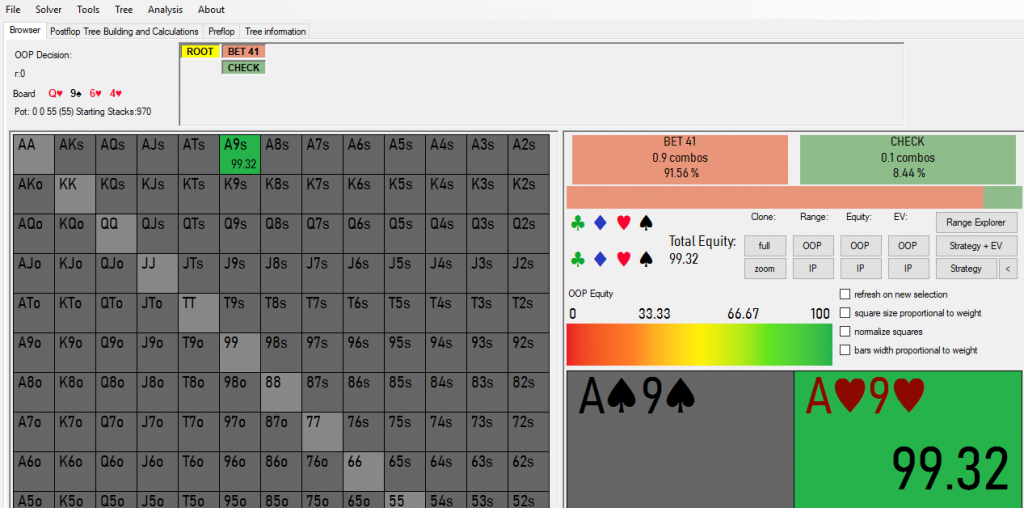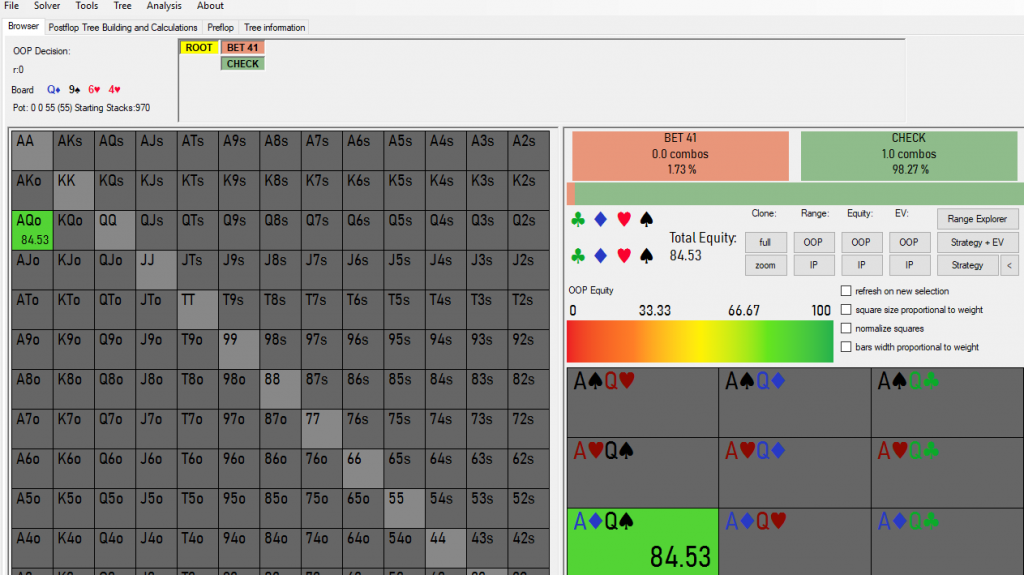The last couple of years of poker have seen an increasing move to understand and apply GTO poker solutions to today’s game. In doing that, there’s been a lot of confusion in the poker community about what GTO (game theory optimal) actually is, and how and when to apply GTO solutions to a given poker situation. We’d like to clear up that confusion and also make a case for why software like Leak Buster is still very important to learning and growing as a poker player.
What is GTO poker?
GTO poker is a solution to any given long term set of hands, so that you cannot be exploited. This is assuming that if your opponent is ALSO applying GTO solutions, then the end result of many hands played with this same person would be a net EV (expected value) of zero.
In each individual hand, a GTO solver will provide the highest EV line, assuming your opponent is also taking a GTO line. This can include mixed strategies of betting 80% of the time, and checking 20% of the time for example. This mixed strategy is based on your current equity you have versus your opponents entire hand range, and the sizing of your desired bet. Even if you are far ahead in equity in a given poker situation, a GTO solver will want you to check a percentage of the time (based on your equity and bet sizing) that will not allow your opponent to exploit your play.
For example: If you had a flush on the turn, and you ALWAYS bet your flush, and never checked, then your opponent would know to fold a larger percentage of their range because your range will always be very strong.

Here, our OOP (out of position player turns the nut flush with Ah9h). The solver wants us to check 8.44% of the time, and bet 91.56% of the time. In reality, against most opponents, especially fishy players and anonymous players, we’d want to bet 100% of the time to get value from other hands. If you were analyzing this hand, you’d conclude that I should be betting here pretty much always. That’s the highest EV line, but to the solver, in order to play perfect GTO poker, it would check 8.44% of the time. This is an extreme example where the betting and checking percentages don’t have much of a difference. Here’s a more common example you’ll see a solver be ideally off in terms of highest EV exploitative line vs. a GTO line, and that’s when you have TPTK (Top pair with top kicker).
Example 2: You have AdQs on a turn of: Qd 9s 6h 4h. The solver in this case, even though the board is very coordinated and you’re first to act, the GTO solution here is to check 98.27% of the time and bet only 1.73% of the time. Against most opponents, this would be a significant EV leak to check here almost all of the time. The solver also has almost never check-raising in this spot (.01%), and most of the time this wouldn’t be ideal exploitative either.

GTO vs. Exploitative play
This should be common sense, but in all poker situations, if there’s an opportunity to exploit your opponents play, you should do it. You only make money in poker when your opponent makes a mistake (takes an non-optimal line) and allows you to exploit that mistake.
An example of exploitative play would be where your opponent only continues on the turn if they have top pair or better. If this was the case, you’d widen your bluffing range, and decrease your value range versus this opponent. They have a clear pattern that can be exploitative. This is where the value of GTO lines comes into a play. If you’re playing against an opponent enough, and you know they’ve seen you take certain lines with specific hands, then you balance this out by taking a more GTO line where you may be checking a strong hand more often then you would when you’re trying to exploit a player and maximize the EV of your hand. In the short term in this situation, you may give up slight EV for that specific range of hands, but in the long term, you’ll get paid off when your opponent reacts sub-optimally and bets when you have a very strong hand or visa-versa because they think they’re picking up on a exploitative pattern in your play. But they aren’t because you’re one step ahead of them.
GTO Solvers are taking a line that prevents them from being exploited by someone else who is applying a perfect GTO strategy, the net result being zero for both players if they are taking the best GTO lines. GTO Solvers are NOT taking the highest EV line with their range of hands, they are taking the highest EV lines with an entire range of hands taking into consideration the fact that:
- You will play lots of more hands with this same opponent, thus you don’t want to become exploitable.
- Your opponent is also applying a GTO solution to their hand.
So in summary, GTO poker is great to learn from a theory perspective. It can illuminate some subtle differences in suit combinations you might have in a given situation, or allow you to understand areas you can increase your check-raise bluff percentage for example. It will however, take less EV lines in certain situations because it assumes your opponent will be playing optimal poker. If you’re a high stakes player playing against some of the worlds best opponents, you need to mix up how and when you bet certain ranges of hands. If you’re a small stakes (even some mid-stakes), or micro stakes player, you should be focusing mostly on learning how to exploit your opponent, while learning the theory of why certain lines are ideal against the very best opponents.
How Leak Buster Fills in the Blanks
This is the purpose of software like Leak Buster. To show you ideal exploitative, high EV lines, against the majority of your competition. You want to maximize the EV of every single hand, especially against opponents you don’t have much history with. If you’re on an anonymous site, you should not be worried about balancing your ranges. You should be going for the highest EV line every time, unless you have a very specific reason not to.
Good luck at those tables!


